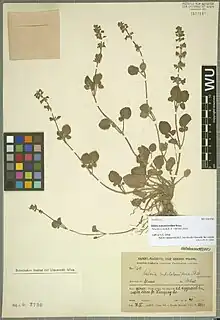Salvia substolonifera
Salvia substolonifera (Buddha's Light) is an annual plant that is native to Fujian, Guizhou, Hunan, Sichuan, and Zhejiang provinces in China, growing on streamsides, crevices, and forests at sea level to 900 m (3,000 ft) elevation.
| Salvia substolonifera | |
|---|---|
 | |
| Scientific classification | |
| Kingdom: | Plantae |
| Clade: | Tracheophytes |
| Clade: | Angiosperms |
| Clade: | Eudicots |
| Clade: | Asterids |
| Order: | Lamiales |
| Family: | Lamiaceae |
| Genus: | Salvia |
| Species: | S. substolonifera |
| Binomial name | |
| Salvia substolonifera E.Peter | |
Salvia substolonifera grows on ascending or trailing stems to a height of 10 to 40 cm (3.9 to 15.7 in). Inflorescences are 2-8 flowered verticillasters in axillary or terminal racemes or panicles, with a 5 to 7 mm (0.20 to 0.28 in) reddish or purplish corolla.[1]
Notes
- "Lamiaceae" (PDF). Flora of China. Harvard University. 17: 170. 1994. Archived from the original (PDF) on 2010-07-14.
This article is issued from Wikipedia. The text is licensed under Creative Commons - Attribution - Sharealike. Additional terms may apply for the media files.